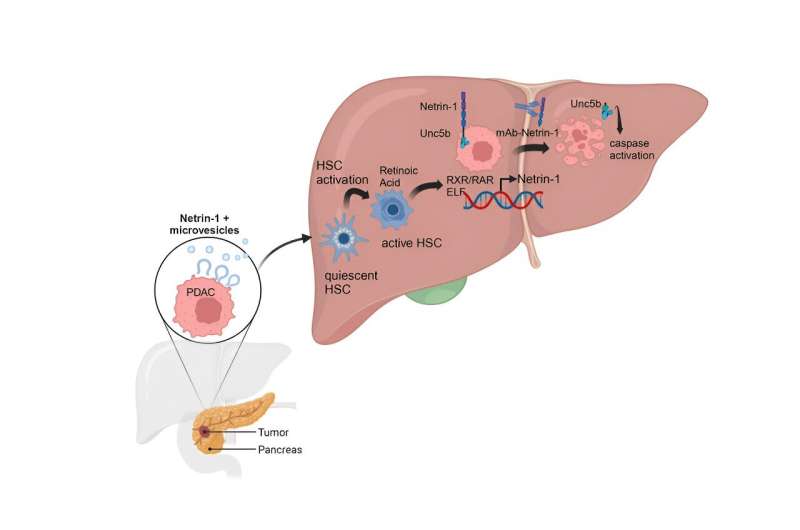This article has been reviewed according to Science X's editorial process and policies. Editors have highlighted the following attributes while ensuring the content's credibility:
fact-checked
peer-reviewed publication
trusted source
proofread
Pancreatic cancer discovery opens the door for new clinical trial

Pancreatic cancer is tricky to manage because it spreads easily and early, and the tumors have a unique biological makeup. But, researchers made a breakthrough by learning about the genetic changes that occur during tumor migration—and also found a drug that can obstruct the process.
The next step is a groundbreaking clinical trial at the University of Rochester's Wilmot Cancer Institute, planned for early in 2024, to test the drug from their laboratory discovery, said senior investigator Darren Carpizo, MD, Ph.D., co-leader of Wilmot's Genetics, Epigenetics and Metabolism research program, and chief of Surgical Oncology at the University of Rochester Medical Center.
"We will be the first institution in the U.S. to study the safety and effectiveness of the experimental drug, known as NP137, on pancreatic cancer that has spread to the liver," Carpizo said.
Carpizo and several collaborators have published the results of their bench science investigation in the journal Cell Reports, and Carpizo will lead the Wilmot clinical trial with Aram Hezel, MD, chief of Hematology/Oncology at Wilmot, and Nabeel Badri, MBChB, a medical oncologist at Wilmot.
The five-year survival rate for pancreatic cancer is only 12%, which is a slight increase in 2023 compared to previous years. The number of cases is rising worldwide, however, and by 2030, pancreatic cancer is predicted to be the second leading cause of cancer deaths.
Why is pancreatic cancer deadly?
First, because it spreads (metastasizes) very early during its development. In 85% of patients, the cancer has already spread outside of the pancreas at diagnosis. Even when the cancer is localized to the pancreas and surgical removal is possible, the majority of patients face a recurrence of their cancer. The metastasis causes these patients to eventually succumb to the disease, which is why researchers are focused on understanding the biology of metastatic pancreatic cancer.
Second, although pancreatic cancer cells do not have to travel far to reach the liver, along the way they genetically reprogram themselves and become stronger. The result: newly seeded cancer cells in the liver have a distinctly different biology from the primary tumor in the pancreas, and are able to resist standard treatment, Carpizo said.
In their latest work, Wilmot researchers built on what was already known about a key gene, Netrin-1, involved in pancreas, breast and colon cancers. They discovered, for the first time, the complex mechanisms that allow Netrin-1 to drive the lethal, genetic changes as pancreatic cancer cells migrate to the liver. They also showed how Netrin-1 activates hepatic stellate cells, which are involved in liver fibrosis, a serious chronic disease, priming the liver as a host for cancer.
In mice and in tissue studies, when researchers suppressed Netrin-1 with the anti-cancer drug (NP137), cancer was less likely to spread and cancer cell death occurred. The team includes scientists from Rutgers University, where Carpizo worked as a surgeon-scientist before joining Wilmot in 2020, Fox Chase Cancer Center in Philadelphia, and a laboratory in France.
The Wilmot clinical trial will likely require eligible patients to take two cycles of NP137 before surgery, undergo surgery to remove the cancer, and then take more of the experimental medication along with chemotherapy after surgery for up to six months, Carpizo said. He noted that NP137 is made by Netris Pharma, of Lyon, France, and is currently being tested in clinical trials in that country.
Carpizo's study is part of a larger collaborative effort at Wilmot aimed at pancreatic cancer. Others, including URMC Surgery Chair David Linehan, MD., and Wilmot investigator Scott Gerber, Ph.D., and members of the Cancer Microenvironment research program, are also conducting studies on new, targeted treatments.
The goal is to use newly discovered drugs in combination with immunotherapy, radiation therapy, and chemotherapy to attack pancreatic cancer.
More information: Crissy Dudgeon et al, Netrin-1 feedforward mechanism promotes pancreatic cancer liver metastasis via hepatic stellate cell activation, retinoid, and ELF3 signaling, Cell Reports (2023). DOI: 10.1016/j.celrep.2023.113369



















